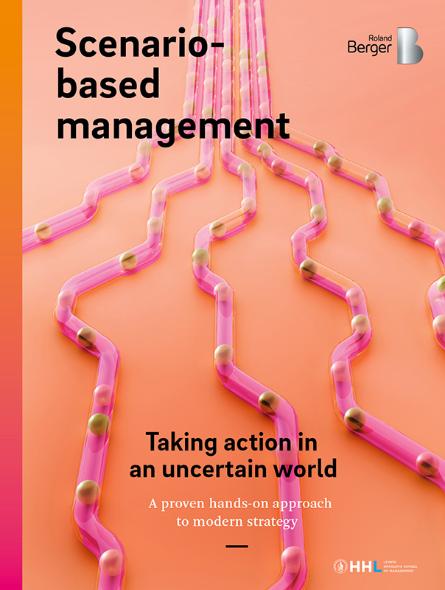Hyperloop is an environmentally clean mode of high-speed transportation. So why is it still struggling to make headway – and how can we give it new momentum?


Scenario-based management – Taking action in an uncertain world
By Heiko Mosetter and Martin Streichfuss
The page has been updated on 06.02.2024.
In today's unpredictable world, thinking in scenarios is an essential skill for top management
Uncertainty is nothing new in the business world: Crises come and crises go. But the level of insecurity that today's companies are facing is truly unprecedented, often paralyzing companies into inaction. This requires a new approach from CEOs, specifically the ability to envision multiple potential future scenarios. For that, they need a systematic approach that ensures alignment, focus and impact. We present a hands-on methodology for scenario-based management that releases firms from their paralysis and helps them get back to work, at the same time as revealing previously overlooked opportunities.
_image_caption_none.jpg?v=1687234)
Today's business world is plagued by overlapping uncertainties in all of the STEEP areas: social, technological, economic, environmental and political – as we discuss in detail in the latest edition of the Roland Berger Trend Compendium . These multifaceted challenges are mutating all the time, making it impossible for companies to rely on the old ways of predicting the future. Instead, they must develop the skills they need to imagine different potential future scenarios, pictures of what possible futures might lie ahead. In other words, they must turn to scenario-based management – the key to building strategy in an uncertain world.
A good first step for companies is to break down their environment into individual challenges: developments in China, the war in Ukraine, supply chain issues and so on. This will shine some much-needed light on the overall situation and enable them to concentrate on critical issues. Armed with this knowledge, they can then investigate which steps they must take. For example, they can look at the reshaping of supply chains and imagine how it will impact their investments, or they can focus on the rise of China and investigate how it might influence their M&A activity.
Yet, not all crises are created equal. Some relate to trends, others to unforeseen events. Companies need to classify and prioritize these challenges in a systematic fashion. In certain cases, the outcome of a crisis will be hard to predict; in others, the direction of action will be clear but the speed with which they need to act and their skills in taking the necessary action will be critical. In all cases, firms will need faster decision-making processes than in the past, clearer decisions, better communication, more flexible action and the ability to systematically realign the business with the environment of ongoing uncertainty.
Here, the Roland Berger Trend Compendium can act as a powerful enabler. Established in 2005 and regularly updated since then, it offers a comprehensive view of long-term developments. This sets the framework within which business needs to operate. The combination of the detailed information in the Trend Compendium with a systematic scenario-based approach comprehensively dissects the complexity, ensures alignment with internal and external stakeholders, "stress-tests" strategies to make sure they include all relevant factors for the future success of the business and enables hands-on action geared towards real results.
Rising to the challenge
Thinking in scenarios is challenging, but it is not impossible. Corporate strategists may face pushback from the organization itself: Some people may object that the scenarios are too far removed from operations. The solution? Embed the scenarios in the organization and place the focus squarely on practical topics and options. Other people may argue that now is the wrong time to think about the future, that other matters are more pressing. But if not now, then when? Scenarios may have been a nice-to-have in the past but today they should be top of the management agenda. In addition to everything else, they enable companies to break with tradition and leave long-established but ineffective practices behind.
We offer a hands-on process that effectively develops a company's ability to think in scenarios. The process lasts just eight weeks and does not place too great a burden upon the company's leaders. In the first step we carry out a series of interviews with the leadership, introducing the idea of thinking in scenarios and specifying the scope of the exercise. We use the Trend Compendium to inspire the scoping and help define the core questions that the company needs to address. In a second step we run 360° surveys with internal and external experts to identify key factors in the different scenarios, using the information in the Trend Compendium as tangible input for the scenario narratives. On this basis we then derive "critical uncertainties" that can affect the scenarios. Next, we run a two to three-hour interactive scenario workshop based on the critical uncertainties to add detail to the scenarios, again using the Trend Compendium for structured input. Finally, in Week 8, we hold a series of short sessions with members of the leadership team with the aim of anchoring the approach with them, deriving strategic action areas – including "no regret" moves that would be beneficial in any scenario – and specifying the tipping points from one scenario to another.
The result? Companies free themselves from their paralysis in the face of uncertainty and get back to work. Instead of jumping from denial to despair, they learn a way to look beyond the horizon with confidence. Scenario-based management is above all liberating: It shifts your focus onto step-by-step actions that have real impact. And in the process, it often brings to light valuable opportunities that had previously gone unnoticed.
Co-authored by Torsten Wulf and Burkhard Schwenker, HHL Center for Strategy and Scenario Planning.
Register now to download our full Scenario-based management study and the latest edition of the Roland Berger Trend Compendium as PDFs.





_person_144.png?v=1687234)
